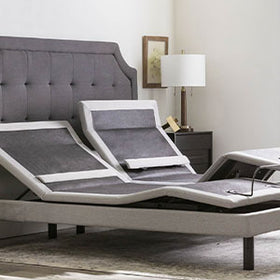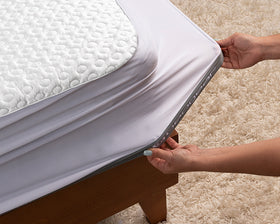888-996-9890

The Best Sleep for Your Health Concerns
Hop Into Bed for Your Health
Back pain and heartburn and indigestion- oh my! There are a variety of health concerns and conditions that can arise as you grow older. Thankfully, you can do some things to help yourself while you’re asleep. Here are a few tips on how to combat some common concern with your sleeping position.
Back Pain
Your spine can experience significant damage if you’re constantly sleeping wrong. Plus, if you already have back problems, sleeping in a poor posture can make them worse. The key to minimizing back pain is keeping your spine in its natural alignment.
According to Jeffrey Goldstein, MD, chief of spine service education at NYU Langone’s Department of Orthopaedic Surgery, the best thing you can do for back pain is lay on your back or side with a pillow placed between your knees to help take the pressure off your lower back.
He also states that “Often people are more comfortable on their back if there’s a pillow behind their knees, or between the knees if they’re on their side.”
A good mattress is also important. If you’re a back sleeper, you’ll want to find something firm and supportive. If you’re a side sleeper, you’ll probably like something with a bit more cushion on top to take the pressure of points like your hips and shoulder. Here is a bit more information about Firm Mattresses and Plush Mattresses.
Shoulder Pain
Charles Bae, MD, a sleep specialist at the Sleep Disorders Center at the Cleveland Clinic says that you can try to side sleep on your good shoulder, but you stand a high risk of flipping over during the night onto your bad shoulder.
He states, “Some mattresses give a bit so there’s less pressure on [your shoulder joints] or hips, but if it’s firm [...], it’s like laying on the floor [...], causing you to shift positions.”
It will be best to begin on your back or stomach instead to decrease your chances of winding up in an uncomfortable position.
Hip Pain
This tip comes from Priyanka Yadav, DO, sleep medicine specialist at Robert Wood Johnson University Hospital, who says that sore hips can get some relief from lying on your back because it straightens the curve of your spine and puts less pressure on your hips.
She mentions that if you’re experiencing hip pain laying on your side will increase the discomfort and can cause additional problems because of the added pressure to the joint.
Neck Pain
The right pillow is one that will keep your head even with your shoulders, minimizing neck pain during the night. According to Dr. Goldstein, you want a pillow that will keep your spine in alignment, so a thicker one for side sleepers and a medium one for back sleepers.
It will just be important not to stack up too many. Remember, we’re trying to keep the neck and spine aligned, not cock it at a weird angle.
Knee Pain
Dr. Bae states that the majority of knee pain is associated with the knees touching and bumping into each other. He recommends putting a pillow or something else soft like a blanket between your legs to minimize this effect.
Additionally, you can flip over onto your back where this isn’t a concern. Or, if you’re more comfortable on your stomach you can try that too, but be wary of the issues this position can cause for your neck.
Snoring
Sleeping on your side is the first basic trick to stop snoring as sleeping on your back can make snore much, much worse because the soft tissues of the throat fall into the airway.
If you have a cold, you may want to elevate your head with two or three pillows to help with drainage or use a chair-like pillow. If you’re the owner of an adjustable bed, you’re in even more luck. You can tilt the top of the bed up and some even have an anti-snore feature.
If the snoring is persistent and/or progressive, see your doctor. It may be the result of a more serious condition.
TMJ Dysfunction
Temporomandibular joint dysfunction, which is a type of jaw pain, you’re better off sleeping face up. And this goes for pretty much all jaw pain.
Ana Paula Ferraz-Dougherty, DDS, spokesperson for the American Dental Association, says that sleeping on your side, especially the affected side, can put pressure on the joint and make it worse.
Obstructive Sleep Apnea
Obstructive sleep apnea is a serious condition that can cause a lot of issues including snoring, teeth grinding, daytime sleepiness, and poor sleep. It occurs when your upper airway is partially or totally obstructed during sleep.
This can cause you to stop breathing for a moment and startle awake when you finally get a good breath. If you have sleep apnea, there are medical devices that can help you to sleep better, and you’ll also want to stay off your back to keep your tongue from blocking your airway.
Additionally, the adjustable base feature mentioned before can help you to stay a bit elevated so that the soft tissues don’t fall back. That way, if you’re a tried-and-true back sleeper you can still lay that way without blocking your airway.
Heartburn
When your stomach valve relaxes so much that it lets acid travel up into the esophagus, you’ve got acid reflux. And trust me, that burning sensation is no joke.
David Johnson, MD, chief of gastroenterology and professor at Eastern Virginia Medical School and past president of the American College of Gastroenterology, has stated that research supports sleeping on your left side because it doesn’t let that valve open as easily.
A wedge-shaped pillow or an adjustable bed can also help to keep you tipped up, which allows gravity to help keep your acids where they belong. For the best result, a pillow that tapers down from about eight to ten inches will be best. If you just stack pillows, it will engage your abdominals and increase pressure on your stomach.
If you’re a side sleeper a wedge pillow or a traditional adjustable bed might be uncomfortable for you since you’re supposed to be laying on your back for those options. However, more and more adjustables are coming out with options that tilt. That way you get the benefit of being at an incline without having to give up your favorite position.
You can check out one of our best-selling tilting adjustable bed here.
There you have it folks! The best sleep position for some of today’s common health complaints. If you have any questions about finding a mattress or adjustable base that can help you with one of these conditions, don’t hesitate to reach out.
You can also check out the Mattress Buying Guide.





